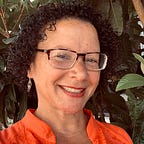Biracial Black Woman
Born in the 70’s to a Black Woman and White man, I was the bridge that brought hatred together.
Raised to be Black, after the age of 7 when my father left.
Black family, Black neighborhood, mostly Black friends, Black church, my only touch of Whiteness was from Summers and holidays with my Paternal Grandparents. Plus the occasional visits with my father that diminished over the years.
I never understood the constant stares directed towards the Brown Black Woman and her Pale-skinned daughter. “You’re Black,” is what my family told me.
A Black male relative told me for years, “You Black! You a strong Black Woman!”
Even as a teenager, I told my Grandmother of an incident, I can’t recall the details at this moment. Her response, “Do you think it was because you’re Black?” “I don’t know,” I responded.
Got my long curls straightened, like all the other Black girls. That’s when the names increased.
As I grew, being called a “White girl,” was foreign other than cousins teasing me in childhood. I didn’t pick up on it. “I’m Black!” was my response.
In my early 20’s, I took a college course entitled, “Melanin and the Experience of Color.” I learned that as a lighter complexioned woman, I had privilege. Shocking!
My first thought, “How am I going to use this to benefit my people?” My people!
From then on I challenged. I already called out racist statement from racist Asian and White co-workers.
I challenged men and women who praised “mixed babies.”
I challenged men who felt they were complimenting me, “Yeah, I think mixed women are more beautiful.”
To the last one I said, “All Black Women are beautiful!” That didn’t last. He ended up calling me an “Angry Black Woman.”
I challenged till I grew tired of challenging. But, when I think of the challenges my more Melanated brothers and sister live with on a daily basis, I can’t take the privilege of stepping back. I won’t take that privilege.
That’s why when a person told me I had no business in the Black Lives Matter movement, my heart stung with a deep, painful ache. The conversation actually started with, “Biracial people don’t belong in the Black Lives Matter movement.” I took a stand. I’ve always taken a stand for my more Melanated Brothers and Sisters, even when they didn’t take a stand for me.
Truthfully, in many areas I can pass for White. I’ve been told my life would’ve been easier. “Easier for whom?” A White life for me is a soulless life, It’s not who I am at my core. I wouldn’t know how, it’s not my upbringing.
Hot water cornbread mornings. Black Grandmothers and Aunties, “Baby, come on ova here and bring…” whatever it is they needed me to bring.
Saturday mornings in the Fillmore with Pinesol, bleach, a scrub brush and Gladys Night and the Pips blasting on the record player. I can still hear “Midnight Train to Georgia” in my head.
Besides, Southern Grandmothers know. They look at me and know my Blackness. I’ve always loved that.
As the years have passed, my identity has shifted. When I reached my 4th decade on this planet, I realized as “Black” as I am, there is another part.
My White Grandmother’s hugs. My White Grandfather teaching me how to Waltz when I was 12. The stability they offered when the rest of my life seemed crazy. Their 74-and-a-half year marriage. My Grandfather, at 88, slowly kneeling down to play cars with my Black son, who was 7 at the time.
I watch as my Grandmother slips a $10 bill in my Son’s hand, like she used to do me. I watch as my Grandfather wakes up from a random nap and pulls my Son over to the antique cabinet as he tells him about every single piece. I listen to my Grandfather and my Son talk about World War II.
While my Blackness pours from my inside every moment, the Whiteness stares me in the face whenever I look in the mirror. I can’t deny one more than the other.
It’s true, I do identify more as a Black Woman. I have to acknowledge that I cannot own the full Black experience.
Don’t get me wrong, I have been followed around a store. When I went up to pay, the clerk asked me “Are you Black?”
Then there was the day an older Southern White woman leaned in and whispered in my ear, “Ya colored, ain’t ya?” To which I loudly replied, “Yeah, I’m Black!” She jumped back in shock.
But the fact is, in the past when I’ve gotten pulled over, the cops have written “Wte” under race every time. EVERY time!
To many in the outside world I’m White. To others I’m Black. Fitting in to one or the other depends on others perceptions, not my experience. I belong to me.
It was in my own inner belonging that decided to call myself a Biracial Black Woman. I leaned into the term quite easily. A four decade long internal battle to belong to one, re-emerged as a love for the combination that created me.
I can’t say I’ve had this profound, Utopian revelation that’s solved all the identity problems that dominated half my life. I honestly still identify as a Black Woman. However, being a Biracial Black Woman feels complete. It’s what I write on the line when I check “other.”
